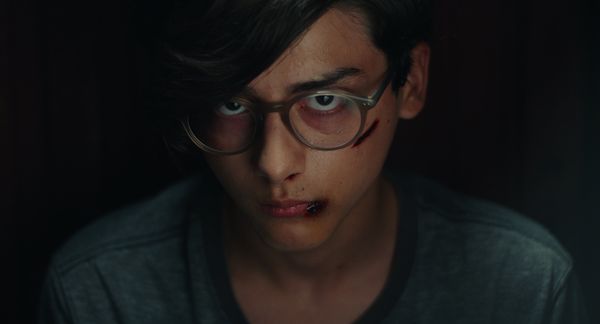Eye For Film >> Movies >> Almamula (2023) Film Review
Almamula
Reviewed by: Jennie Kermode

Panchito is missing. Nobody knows what happened to him. He disappeared before Nino (Nicolás Díaz) and his family arrived in the village. His shadow hangs over everything. Nino and his sister Natalia (Martina Grimaldi) are told not to go into the forest. Their mother wants them to stay close to the house, the school, the church. But something in Nino is attracted to the wilder places, and he already knows that being part of the community is no guarantee of safety.
The family has moved out to the village, close to where Nino’s father works tearing down trees to build houses, because Nino has suffered a violent homophobic assault. We see this in the film’s opening scenes: the frightened 12-year-old pursued by a mob of other kids, knocked down, punched and kicked repeatedly, then dumped into the back of a truck which is, obscurely, full of toads. The village isn’t exactly gay-friendly, but there he is treated with concern rather than hatred, as a lost member of the flock who can resume a Christian way of living if he receives the right guidance. The trouble is, every time people talk to him about how he ought to behave, they simultaneously confront him with an image of a semi-naked man on a cross, which isn’t sending his raging adolescent hormones the message that they seem to think.
This is North West Argentina, and everywhere there is tension between patriarchal civilisation, with its religious strictures and urban, capitalistic urges, and the wildness of the forest, whose lore is preserved by old women, whose threatening spirit takes feminine form. There are many versions of the almamula in the folklore of this region. Often she is simply a supernatural mule whose terrifying cry presages death, but here she is very clearly a female figure, as depicted in a painting which Natalia finds in the house and remembers they used to be afraid of when they were small. Natalia is now at the age for trying to summon such spirits when hanging out in the evening with friends, daring each other, testing boundaries – yet almost everyone in the community, regardless of age, feels threatened by something out there, whether they put a name to it or not.
The exceptions are the men who work among the trees, many of them in the employ of Nino’s father. It is men like this whom he fantasises about in scenes which may inspire concern in viewers, because he is still a child, and for all we know, one of them may have taken Panchito. Whilst the church community may think it is protecting the boy, his inability to talk to anybody about his desires makes him very vulnerable. It’s a lonely, difficult coming of age, and one which gradually leads him to identify with the otherness of the forest – a place which is also under threat.
A semi-autobiographical film with a potent sense of place, Almamula alternates between realism and fantasy, its camerawork reflecting the conflicting ways of thinking at its core. We are never allowed to forget Nino’s smallness, whether he is wandering among the trees or encountering one of the gigantic machines which his father uses, but Díaz gives him an inner boldness which resists confinement. Though he is often solitary, other children in the village do not shun him, and we wonder if some of them, for whatever reason, have similar feelings of frustration. There is a mirror here for much greater conflicts going on in the world and young people’s growing awareness that their challenges and priorities will be very different from those of preceding generations.
There’s a quiet intensity about this film which speaks to that sense of urgency, and a darkness which is rare in today’s LGBTQ+ cinema. Screening as part of Inside Out 2023, it has a distinctive voice, an oddness which will haunt you.
Reviewed on: 28 May 2023















